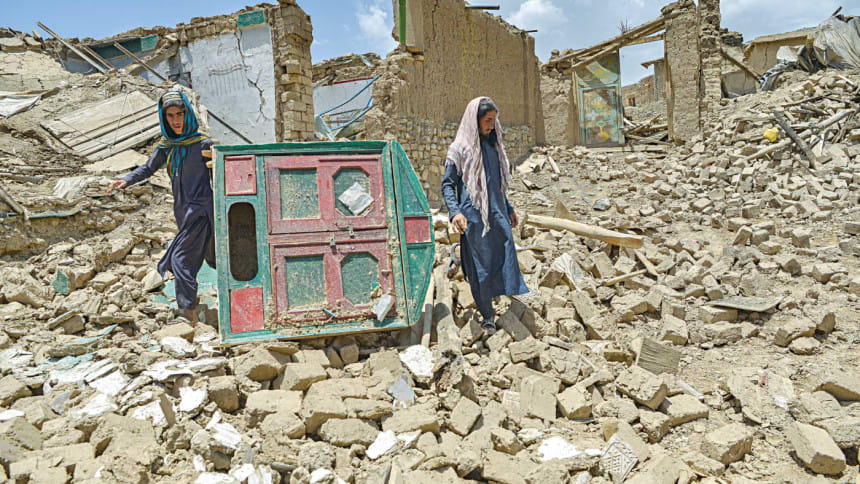‘Nothing is left here’

Organised rescue efforts are struggling to reach the site of an earthquake in Afghanistan that has killed more than 1,000 people, as survivors dig through the rubble by hand to find those still missing.
Wednesday's 5.9-magnitude quake struck hardest in the rugged east, downing mobile phone towers and power lines while triggering rock and mudslides which blocked mountain roads. Heavy rain and poor communication were also preventing rescuers from reaching to the most affected areas.
The quake was Afghanistan's deadliest in two decades and officials said the toll could rise. An estimated 1,500 other people were reported injured, the state-run news agency said.
Entire villages have been levelled in some of the worst affected districts, where survivors said they were struggling to find equipment to bury their dead.
"When I came out of my house it was quiet because all the people were buried under their homes. Nothing is left here," said 21-year-old Zaitullah Ghurziwal.
"There are no blankets, tents, there's no shelter. Our entire water distribution system is destroyed. Everything is devastated, houses are destroyed. There is literally nothing to eat."
The disaster poses a huge logistical challenge for Afghanistan's new Taliban government, which has isolated itself from much of the world by introducing hardline Islamist rule that subjugates women and girls.
"Getting information from the ground is very difficult because of bad networks," Mohammad Amin Huzaifa, head of information for badly hit Paktika province, told AFP yesterday.
"The area has been affected by floods because of heavy rains last night... it is also difficult to access the affected sites."
The aid-dependent country saw the bulk of its foreign assistance cut off in the wake of the Taliban takeover last August, and even before the earthquake the United Nations warned of a humanitarian crisis that threatened the entire population.
UN Secretary-General Antonio Guterres said the global agency has "fully mobilised" to help, deploying health teams and supplies of medicine, food, trauma kits and emergency shelter to the quake zone.
Afghan government spokesman Zabihullah Mujahid yesterday tweeted that aid flights had landed from Qatar and Iran, while Pakistan had sent trucks carrying tents, medical supplies and food across the land border.
The UN said its World Food Programme (WFP) was sending food and logistics equipment to affected areas, with the aim of initially supporting 3,000 households.
The UN humanitarian coordinator for Afghanistan, Ramiz Alakbarov, told reporters nearly 2,000 homes were likely destroyed -- a huge number in an area where the average household size is more than 20 people.
The healthcare system in Afghanistan was already on the verge of collapse. Even before the Taliban takeover, Afghanistan's emergency response teams were stretched to deal with the natural disasters that frequently strike the country.
But with only a handful of airworthy planes and helicopters left since they returned to power, any immediate response to the latest catastrophe is further limited.
"The government is working within its capabilities," tweeted Anas Haqqani, a senior Taliban official.
"We hope that the International Community & aid agencies will also help our people in this dire situation."
Describing the rescue efforts in Paktika, one volunteer, Faiz Muhammad Sameem, 36, said: "Ambulances, helicopters and motorcycles, everyone is involved in relief but the hospital does not have enough facilities, the first aid was provided in the hospital.
"It's a horrific scene. There were people who lost all of their family members. Some have lost 10 family members or some people have lost entire families.
"I've seen a five-year-old child who was the only survivor in his 13-member family. I don't know how he will survive or if he knows what he has lost. It is unbearable."
The United States, whose troops helped topple the initial Taliban regime and remained in Afghanistan for two decades until Washington pulled them out last year, was "deeply saddened" by the earthquake, the White House said.
"President Biden is monitoring developments and has directed USAID (US Agency for International Development) and other federal government partners to assess US response options to help those most affected," National Security Advisor Jake Sullivan said in a statement.
Afghanistan is frequently hit by earthquakes, especially in the Hindu Kush mountain range, which lies near the junction of the Eurasian and Indian tectonic plates.
Afghanistan's deadliest recent earthquake killed 5,000 in May 1998 in the northeastern provinces of Takhar and Badakhshan.

 For all latest news, follow The Daily Star's Google News channel.
For all latest news, follow The Daily Star's Google News channel. 



Comments